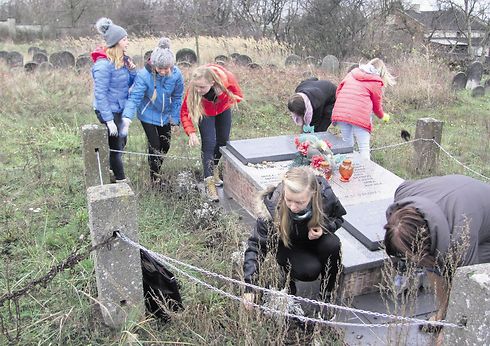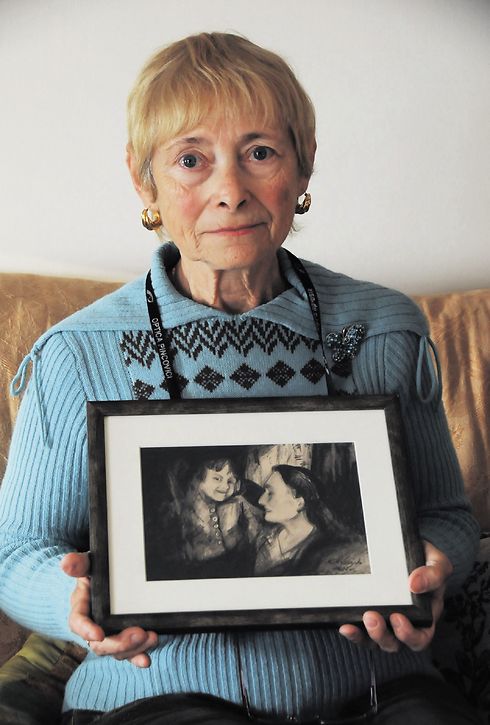When Holocaust survivor Anya Ponimonsky of Kiryat Bialik, 77, told her life story to Polish students from the small town in which she grew up, she never imagined that they would return home and take it upon themselves to take care of the neglected Jewish cemetery.
Last week Anya Ponimonsky of Kiryat Bialik, 77, opened her mailbox and to her surprise found pictures of Polish students tending to the Jewish cemetery in the small town she grew up in.
Ponimonsky’s grandmother and aunt are buried there along with 21 other Jews who were murdered by the Nazis in a cruel massacre, following which she was left alone. Ponimonsky couldn’t believe her eyes.

In tears, she called her husband Marek and told him: “They kept their promise.”
This moving story started about six weeks ago, during a visit to Kiryat Bialik by a group of teenagers from Poland. Ponimonsky stood before the students and told them her story of surviving the ghetto in her hometown, Radomsko.
At the end of her talk, Ponominsky spoke painfully about the Jewish cemetery in Radomsko that fell into neglect, making it near-impossible to identify the graves under the dense vegetation.
The Polish students were deeply moved by her life story and promised that they would take care of the Jewish cemetery when they returned home.
During all her years in Israel Ponimonsky never spoke about what happened to her in the Holocaust. She made aliyah to Israel 54 years ago, worked as a midwife and then a nurse, met Marek, got married, had two children who gave her grandchildren and 17 years ago retired.
Only when she reached the age of 66 did she start to open up about what she’d been through, sharing with her family the horrors that she experienced. A few months ago Ponimonsky took a return tour to Poland with her husband, children and grandchildren to visit the landscape of her childhood.
What was it that made you reveal your past?
“There wasn’t any special incident. It happened naturally. You reach an age at which you are no longer chasing financial support and bringing up children. You’re more settled, you see your life and your past more clearly.
“When we came to Israel, everyone kept silent. We were young, we didn’t know the language, we started families. We were busy with the present and the future. We didn’t speak about the past.

“Every year, on Holocaust Remembrance Day, we watched television and cried. I heard stories, compared my situation with theirs, and realized that our people had undergone a serious shock. The children saw me crying and knew that I was a Holocaust survivor, but they didn’t know my story.”
Stage fright
Ponimonsky started to tell her children, Haim and Yossi, about her past. After that she told her grandchildren, and gradually her other family members.
Then, together with her husband, she started to search online for people from the same period of her life and looked at the places she’d been and how they appear now.
Because of her special and moving story, the army started to send soldiers to her in order to hear her tale, even though revealing her story was emotionally difficult.
About two months ago Ponimonsky received a phone call from the Kiryat Arba municipality, in which she was notified that a delegation of teenagers from Radomsko, where she grew up, was due to arrive. She was asked if she would be able to meet them. Ponimonsky agreed immediately, in spite of her difficulties in speaking before a crowd.
“When I stood in front of them, I was filled with a sense of mission, power and adrenaline. I stood and talked continuously, without a blackout. I wanted to tell the world that they don’t see us in the right way and that a minority has blotted our entire people.
“It was important to me that they would understand that this could also happen today, that people interested in culture, theatre and concerts can turn into murderers from one day to the next.”
This week, a few weeks after the students returned to Poland, we spoke over the phone in a conversation organized by the school principal. The students told how they were affected by Ponimonsky’s story and how they saw the Jewish people in the land of Israel.
Maciej Zamiciwicz, 15, said: “I learned from her story that life is not something to be taken for granted. We live a good life today, but at any moment things could change because of extremism.”
As reported by Ynetnews
